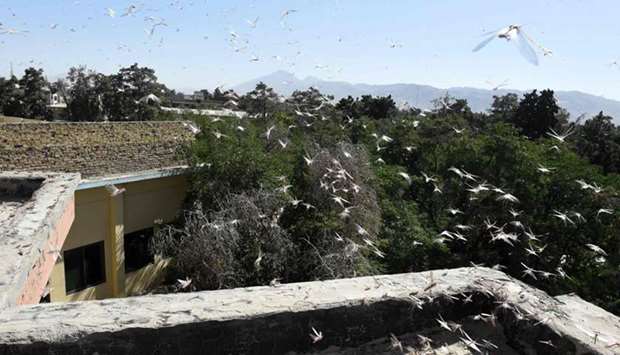The federal government gearing up to launch a World Bank-funded locust emergency and food security project in the country amid claims by a federal minister that the catastrophic impact of locust attacks on crops has been minimised with the help of local authorities.
The $200mn project, the first federal agricultural project to be financed by the World Bank, had been submitted for approval by the Central Development Working Party (CDWP) of the Planning Commission for its upcoming meeting, according to a press release.
The Locust Emergency and Food Security (LEAFS) project would carry out its activities in 18 districts: nine in Baluchistan, four in Punjab, four in Sindh, and one in Khyber Pakhtunkhwa.
Meanwhile, Federal Minister for National Food Security and Research Syed Fakhar Imam claimed that the impact of desert locusts on the country’s agriculture had been minimised to some extent, and that by and large the situation was under control.
The joint efforts of the ministry of national food security and research, the National Locust Control Centre (NLCC), the National Disaster Management Authority (NDMA), the Provincial Disaster Management Authority (PDMA), the provincial governments, the Pakistan Army, the Space and Upper Atmosphere Research Commission (Suparco), the Pakistan Meteorological Department (PMD), and the survey group under the engineering-in-chief of the Pakistan Army had helped stabilise the situation to a great extent in majority of the affected areas, he added.
According to the minister, 20 dedicated aircraft would be used in the operation to control desert locusts.
The government would be buying six aircraft, while the remaining would be hired on lease.
Imam stated that the Department of Plant Protection had a well-established fleet of 20 aircraft before devolution, but 16 of those machines had become dysfunctional, and one of the four remaining had crashed in February this year, a tragedy in which the pilot and an engineer were killed.
Two pilots had been engaged and their training had been completed, the minister added according to a statement released to the press.
The World Bank-funded project’s objectives would include controlling locust outbreak, mitigating the negative social and economic impact associated with it, and strengthening the national food security system.
The ministry of national food security and research would be responsible for the project’s implementation along with provincial governments, the Department of Plant Protection, the NLCC, and the NDMA.
The ministry would take up the role for overall co-ordination of project implementation through establishing a federal project steering committee, responsible for approval of annual work plans, monitoring and review of financial reporting, third party validation if needed, mid-course corrections in the project, and re-allocation of funds.
A component of the project relates to the livelihood protection and rehabilitation to provide a robust protection scheme that ensures immediate relief to affected farmers and livestock owners.
A system would be ensured to strengthen national capacity for early warning and early response, linking these efforts to existing regional and provincial locust surveillance and control networks.
A project management unit would be established to ensure monitoring and evaluation to ensure project implementation.
The primary beneficiaries of the project would be farmers and agricultural labourers living in areas prone to desert locust infestation.
For these groups, the proposed project would prevent locust infestations from damaging their livelihoods and provide compensatory income support.

Locusts are seen over a residential area in Quetta. Farmers are struggling as the worst locust plague in decades wipes out entire harvests in Pakistan’s agricultural heartlands, leaving people scrambling for income.
